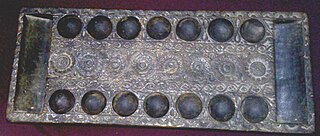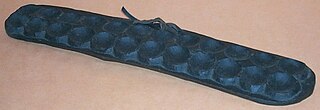Related Research Articles

Chinese checkers (US) or Chinese chequers (UK), known as Sternhalma in German, is a strategy board game of German origin that can be played by two, three, four, or six people, playing individually or with partners. The game is a modern and simplified variation of the game Halma.

Mancala is a family of two-player turn-based strategy board games played with small stones, beans, or seeds and rows of holes or pits in the earth, a board or other playing surface. The objective is usually to capture all or some set of the opponent's pieces.

Kalah is a modern variation in the ancient Mancala family of games. The Kalah board was first patented and sold in the United States by William Julius Champion, Jr. in the 1950s. This game is sometimes also called "Kalahari", possibly by false etymology from the Kalahari Desert in Namibia.
Ba-awa is a variant of the game of mancala originating in Ghana. Although played in some of the same regions as Oware, it is simpler and in traditional societies is considered a game for women and children. Ba-awa is related to games j'erin and obridjie played in Nigeria. It is also similar to mancala game anywoli played at the Ethiopian-Sudanese border.

Bao is a traditional mancala board game played in most of East Africa including Kenya, Rwanda, Tanzania, Comoros, Malawi, as well as some areas of DR Congo and Burundi. It is most popular among the Swahili people of Tanzania and Kenya; the name itself "Bao" is the Swahili word for "board" or "board game". In Tanzania, and especially Zanzibar, a "bao master" is held in high respect. In Malawi, a close variant of the game is known as Bawo, which is the Yao equivalent of the Swahili name.

Southeast Asian mancalas are a subtype of mancala games predominantly found in Southeast Asia. They are known as congkak in Malaysia; congklak, congkak, congka, and dakon in Indonesia and Brunei; and sungkâ in the Philippines. They differ from other mancala games in that the player's store is included in the placing of the seeds. Like other mancalas, they vary widely in terms of the rules and number of holes used.

Pallanguli, or Pallankuli, is a traditional ancient mancala game played in South India, especially Tamil Nadu and Kerala. This game was later introduced to Karnataka and Andhra Pradesh in India, as well as Sri Lanka and Malaysia. The game is played by two players, with a wooden board that has fourteen pits in all (hence, it is also called fourteen pits, or pathinālam kuḻi. There have been several variations in the layout of the pits, one among them being seven pits on each player's side. The pits contain cowry shells, seeds or small pebbles used as counters. There are several variations of the game depending on the number of shells each player starts with.
Traditional Filipino games or indigenous games in the Philippines are games that are played across multiple generations, usually using native materials or instruments. In the Philippines, due to limited resources for toys, children usually invent games that do not require anything but players. There are different kinds of Filipino traditional games which are well-suited for kids, and the games also stand as one of the different cultural and traditional games of the Philippines. Due to the variety of skills used in these games, they serve an important purpose in the physical and mental development of Filipino children. These games are also an important part of Filipino culture.

Oh-Wah-Ree is a mancala variant designed by Alex Randolph and published in 1962 by 3M as part of their bookshelf game line. The name "Oh-Wah-Ree" is taken from Oware, a typical West African game for which it is based on. It is played on a board with a ring of pits and stone playing pieces, distinguished from other mancala variants by the use of a second ring of holes to mark ownership of pits by the players, allowing play between more than two players at a time. The object is to capture the opponents' stones.

Ô ăn quan is a traditional Vietnamese children's board game. This game is valuable for enhancing calculating and strategical ability.

Ali Guli Mane is an abstract strategy board game of the mancala family, from Karnataka in South India. It is known as Chenne Mane in Tulu Nadu, Akal Patta in North Karnataka, and Satkoli (सत्कोलि) in Maharashtra. The name of the game, like that of many mancala games across the world, is simply a description of the board used: it means a "wooden block with holes". It is similar to pallanguzhi from the neighbouring state of Tamil Nadu. There are also similarities with the traditional Malay mancala game congkak.
Daramutu is a traditional mancala game from Sri Lanka. It was first described in 1909 by the British engineer Henry Parker in his book Ancient Ceylon (1909). Traditionally, the game is only played by women.

Enkeshui is a traditional mancala game played by the Maasai of both Kenya and Tanzania. It is a rather complex mancala game, and bears some similarities to the Layli Goobalay mancala played in Somaliland.
Kiothi is a traditional mancala game played by the Meru people in Kenya. The word "kiothi" simply means "to place". This mancala is closely related to the Enkeshui and the Giuthi mancalas, respectively played by the Maasai, the Kikuyu and Embu people.

Kisolo is a traditional mancala game played by the Luba, Lulua and Songye peoples of DR Congo, Zambia and Zimbabwe. It is closely related to other East African mancalas such as Bao, Bao Kiarabu, Coro and Isolo.

Layli Goobalay is a board game played in parts of Somalia. It is a variant of the classical count and capture game mancala, which is one of the oldest two-player strategy board games played throughout the world. Layli Goobalay means "to exercise with circles" in the Somali language.

Mangala is a traditional Turkish mancala game. It is strictly related to the mancala games Iraqi Halusa, Palestinian Al-manqala, and Baltic German Bohnenspiel. There is also another game referred as Mangala played by the Bedouin in Egypt, and Sudan, but it has quite different rules.
Mbothe is a traditional mancala game played by the Pokomo people that live along the Tana River, in Kenya. Pokomo do not traditionally build gameboards; they dig pits in the ground and use small stones as counters.
La'b Hakimi, also known as La'b Akili, is a mancala game played in Syria.
References
- ↑ Stewart Culin. "Mancala, The National Game of Africa". University of Waterloo. Archived from the original on 9 August 2011. Retrieved 2 September 2011.